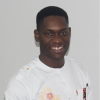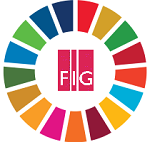News in 2022

|
FIG and the Sustainable Development Goals -
Young Surveyors Network
May 2022
FIG Task Force on FIG and the Sustainable Development Goals together
with the ten Commissions have worked on their role on the sustainable
development goals relevant for their Commission.
Chair of the Young Surveyors Network Kwabena Asiama gives his Statement on the
sustainable development goals in relation to the Young Surveyors
Network
|
 |
Kwabena Asiama, chair of the Young Surveyors Network and lecturer
at the Leibniz University of Hannover with a focus on Land
Administration shares which SDGs are most relevant for him and his how
he makes it a conscious effort to include it in his daily work:
As a network of FIG, the YSN’s main aim is to ensure the involvement
of young surveyors in the activities of FIG and also outside FIG, as
well as ensuring the future of our profession. This is translated into
the work of the network. The core SDG with which the network works, is
the SDG 4 – Ensure inclusive and equitable education and promote
life-long learning opportunities (Quality Education). Other SDGs that
directly apply to the work of the network include SDG 1: No Poverty, SDG
5: Gender Equality, SDG 6: Clean Water and Sanitation, and Goal 11:
Sustainable Cities and Settlements. Reducing Inequalities also
have a tangential link to my work.
The YSN in various ways continues to contribute to the aforementioned
SDGs. Furthering our goal of ensuring the future of our profession, the
YSN has also partnered with the FIG African Regional Network (ARN), and
the Australian Surveying and Spatial Sciences Institute (SSSI) to pilot
the FIG Mentoring Programme in the African Region, using the
intellectual property of SSSI. It is envisaged that the lessons from
this pilot will allow us to roll out a wider mentoring programme for
young surveyors.
In relation to SDG 4, the Network, is contributing to the report on
“Enhancing Surveying Education through Effective Blended Learning”. This
is a joint FIG Commission 2 and FIG Young Surveyors Network Working
Group that is looking at the way students learn and study in the context
of blended learning. Working group 2.3 will contribute to the final
Commission 2 report Enhancing Surveying Education through Effective
Blended Learning through considering the different approaches leaners
have in the context of blended learning. The aim of this working group
is to explore the learning and studying approaches used by surveying
students globally and to better understand how these approaches differ
across regions, age, religion and gender.
The Network further contributes to SDG 6, with the Mapping the
Plastic project led by FIG Commission 4 on hydrography. Working Group
4.3, a joint Commission 4 and Young Surveyors Network undertaking, is
FIG’s response to this overwhelming plastics problem. Our objective is
to enable the accurate mapping of plastic waste within waterways and
provide regulators with reliable spatial information with which to
identify unsustainable waste disposal practices, infrastructure
shortcomings and inform robust land use controls with the goal of
eradicating the dumping plastic waste into rivers.
The network further contributes to the SDGs 1, 5, and 11, through the
Volunteer Community Surveyor Programme (VCSP). The VCSP is a three-path
volunteer programme, in-person, e-volunteering, and knowledge portal
paths, which allows young surveyors the ability to volunteer flexibly in
presence, or remotely. Led by a vibrant and motivated group of young
surveyors from across the globe, the programme partners with bodies
within FIG and outside it to achieve its goals. “Working with the SDGs
is a default position of the VCSP. It is an innate goal of the, given
the main vision is to achieve “land rights for all” and contribute to
the fight against environmental crisis”, says the core team of the
programme. The core SDGs that the programme works with are the SDG 1 (No
poverty), and SDG 5 (Gender Equality) with the work extending to
contribution to the SDGs 2 (No Hunger) through partnerships for food and
agriculture for development, to the SDG 4 (Quality Education) through
the Wisdom Workshops, as well as the practical experience gained by
young surveyors on deployment. With regards to SDGs 5 and 10, this is an
aspect that requires a conscious effort to apply. This is included in my
daily work, by making sure research undertaken looks at all aspects of
the society, especially the marginalized groups, as well as highlighting
such Global Challenges in relation to local problems when teaching.
Also Kwabena reflects on how FIG and its members and delegates
have contributed to the achievement of the SDGs.
With one of underlying factor towards the SDGs is partnerships. The
initiatives undertaken by the Young Surveyors Network have been possible
through the support of our various partners.
FIG has inspired me with their effort to support the establishment of
the FIG YSN Volunteer Community Surveyor Programme (VCSP). Young
Surveyors have now the opportunity to volunteer their time towards
meeting almost each of the geospatial related SDGs. As a
federation, FIG has garnered a lot of respect throughout the geospatial
world. The Federation therefore sits in a position to further bridge
different countries, cultures, and surveying disciplines to create a
stage for co-operation towards meeting the Agenda 2030.
Read more about
the Young Surveyors Network here
Kwabena Asiama and Paula Dijkstra
May 2022






























